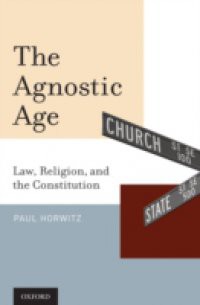The Agnostic Age: Law, Religion, and the Constitution is a book for lawyers, law professors, law students, lawmakers, and any citizen who cares about church-state conflict and about the relationship between religion and liberal democracy. It provides a way to understand and balance the conflicts that inevitably arise when neighbors struggle with neighbors, and when liberal democracy tries to reach common ground with religious beliefs and practices. Paul Horwitz argues that the fundamental reason for the church-state conflict is our aversion to questions of religious truth. By trying to avoid the question of religious truth, law and religion has ultimately only reached a state of incoherence. He asserts that the answer to this dilemma is to take the agnostic turn: to take an empathetic and imaginative approach to questions of religious truth, one that actually confronts rather than avoids these questions, but without reaching a final judgment about what that truth is. This book offers a sensitive and sensible approach to questions of church-state conflict, justifying what the courts have done in some cases and demanding new results in others. It explains how the church-state conflict extends beyond law and religion itself, and goes to some of the central questions at the heart of the troubled relationship between religion and liberal democracy in a post-9/11 era.

